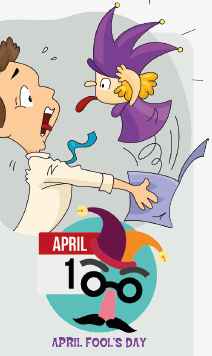Beware of the Pranks!
In Britain, for many people, 1st of April means celebrating April Fool’s Day. But how does it work? Well, if someone can find a way to trick a person before midday, then they become known as the ‘April Fool.’ The tradition probably began in France in the 16th century, when the calendars changed and ten days were cut from the year 1582. Many people forget the new days and other people made fun of them.
This annual tradition is repeated in different countries and cultures around the world, but not always on the same date, and with different kinds of a joke:
-In France, the tradition is called ‘April fish,’ and you have to try to pin a paper fish on another person’s back without them noticing.
-The Portuguese celebrate this day on the Sunday and Monday before Lent; The custom throws flour at each other.
-In Belgium, children have to try to lock their parents or teachers out of the house or school. Then they as for treats before letting them in.
And it is not just individuals who try to trick people. TV channel, radio shows, and businesses around the world trick people with false stories. Some stories have become famous. On the 1st of April 1998, Burger King advertised its new ‘hamburger, free for left-handed people.’ And many right-handed people complained! In Cologne, Germany, one radio programme announced that people were required to run faster than 10km/h in city parks so that they wouldn’t upset the squirrels.
The BBC has taken part in April Fool’s Day for decades. In 1957, a news programme reported that people grew spaghetti in Italy and it showed a film of people picking long strings of spaghetti from trees. Millions of viewers were fooled, and some even called BBC to ask where they could buy a spaghetti tree. More recently, BBC nature documentary reported that some of the penguins in Antarctica could fly. It showed a film of the birds flying to the Amazon rainforest to enjoy the sunshine. It didn't fool many people, but it became one of the most popular videos on the internet.

